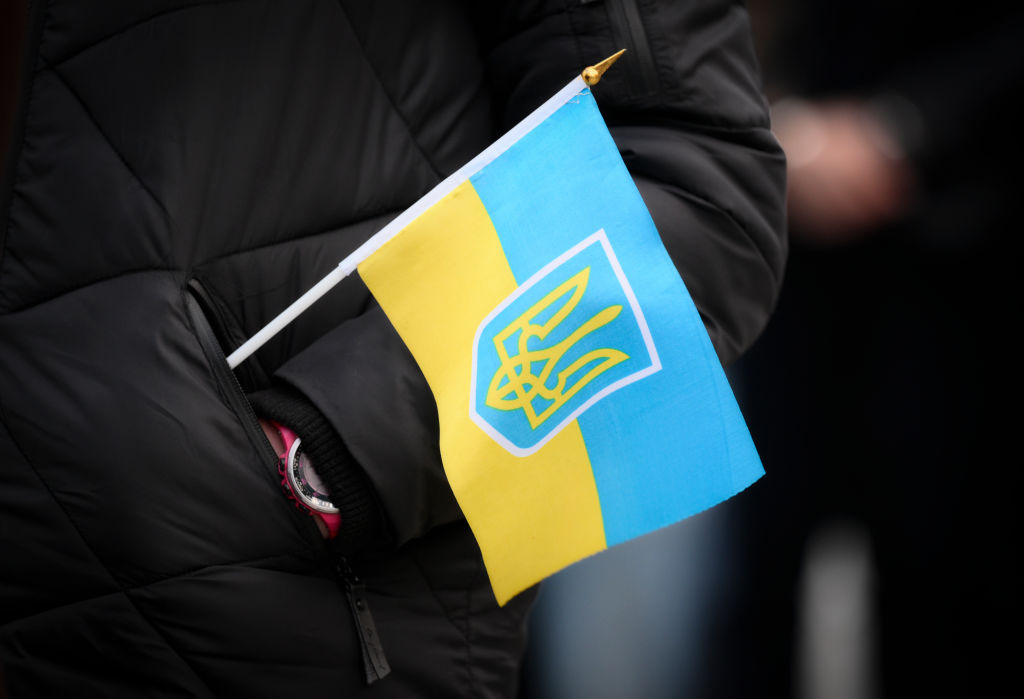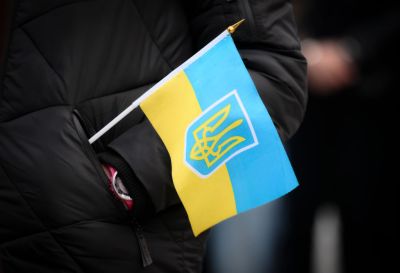Claims are circulating online that the Ukrainian coat of arms is primarily representative of far-right nationalist groups in the country that collaborated with the Nazi occupation of Ukraine during World War II. These claims are false. The famous trident symbol has been a symbol of Ukrainian nationhood for more than a millennium.
The posts in question claim that the trident represents allegiance to the Order of Ukrainian Nationalists (OUN), a collaborationist militia that participated in Nazi atrocities during World War II. They further claim that President Volodymyr Zelensky’s decision to wear clothes bearing the symbol indicates his sympathy for the OUN and their actions.
While OUN might have adopted a version of the symbol for its own use, in fact, the provenance of the trident is far older and its symbolic resonances within Ukraine far more varied than these posts suggest. As described by the official Ukrainian government website,
The trident was the ancestral sign of the Rurik dynasty (10th-12th century, Kyivan Rus’ times). Archaeologists still find its image on coins, seals, utensils, bricks, murals. Back in the 10th century, the obverse of coins during the times of Volodymyr the Great, the Prince of Kyiv, bore his portrait. On the other side of the coins, the trident was depicted as Volodymyr’s symbol of power.
The same webpage goes on to note that “with over 40 (!) theories about its actual meaning, it’s hardly possible to find the real roots of the symbol. The theories vary from referring to trinity, bow with arrows, candlestick to pointing out its similarity with anchor and even falcon’s wings.”
Following the collapse of the Russian Empire in 1918, the trident symbol was adopted by the short-lived Ukrainian People’s Republic as the national coat of arms. It was re-adopted upon Ukraine’s independence in 1991 and noted as such in Article 20 of the Ukrainian constitution.
Previous administrations in Ukraine were criticized for being seen as sympathetic to OUN. Former Ukrainian President Viktor Yushchenko was condemned by many observers for bestowing the government’s highest honor, “Hero of Ukraine,” on OUN leader Stephen Bandera. Reuters reported in 2015 that the Ukrainian government came under heavy criticism when a legislative attempt was made to recognize the OUN, along with other fascist organizations, as “fighters for Ukrainian independence in the 20th century” and to ban criticism of these groups despite their enthusiastic participation in the Holocaust. Moreover, both Yushchenko and his successor, Petro Poroshenko, attended memorials to OUN fighters held at Babi Yar, the site of the single-worst massacre of Jews during the Holocaust. There is no evidence, however, that Zelensky has ever sought to associate himself with the OUN.
If you have a claim you would like to see us fact check, please send us an email at factcheck@thedispatch.com. If you would like to suggest a correction to this piece or any other Dispatch article, please email corrections@thedispatch.com.






Please note that we at The Dispatch hold ourselves, our work, and our commenters to a higher standard than other places on the internet. We welcome comments that foster genuine debate or discussion—including comments critical of us or our work—but responses that include ad hominem attacks on fellow Dispatch members or are intended to stoke fear and anger may be moderated.
With your membership, you only have the ability to comment on The Morning Dispatch articles. Consider upgrading to join the conversation everywhere.